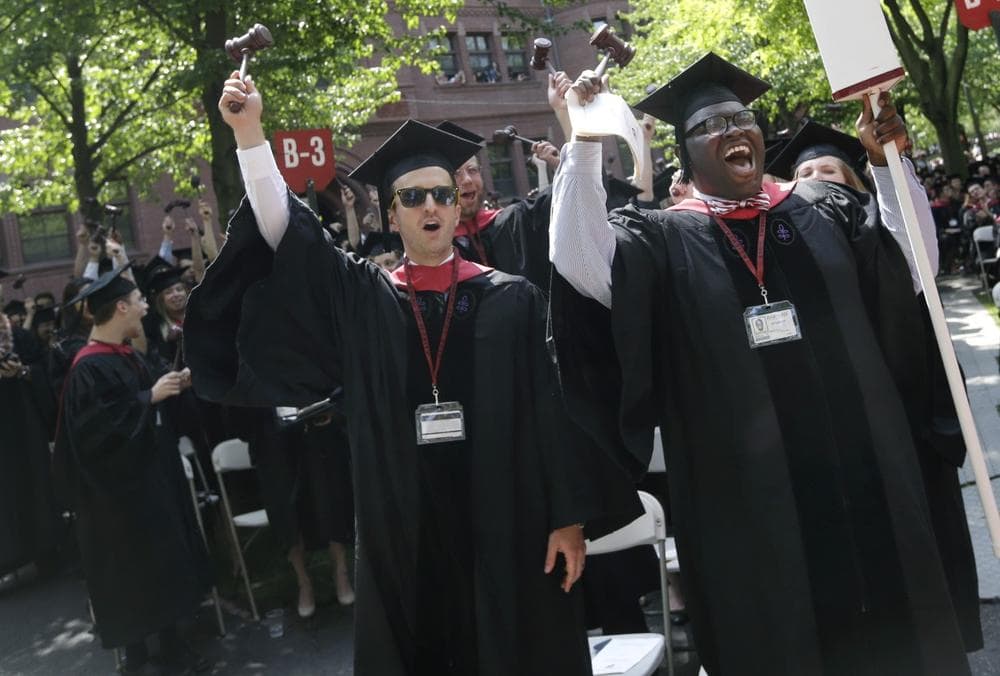Advertisement
Experts: Know Career Prospects Before Choosing Degree
Resume
There was a time when having a bachelor's degree — be it of art, science, philosophy — was considered a ticket to economic security. But try telling that to many members of the graduating classes of the past five years.
A new report (PDF) out of Georgetown University's Center on Education and the Workforce suggests that not all degrees are created equal.
Anthony Carnevale, director of the Georgetown center, and Jennifer Barone, career specialist for the College of Liberal Arts at UMass Boston, joined Radio Boston to discuss the topic.
The Numbers
Carnevale's Georgetown study finds the unemployment rate for new college graduates is 7.9 percent. The jobless rate drops as grads get older: For those age 30 and older, the rate is below 5 percent.
But Carnevale's study also illustrates what anecdotal evidence has suggested for years: that some majors yield better employment (and salary) prospects than others. For example:
-- New information systems graduates currently face 14.7 percent unemployment, while the rate for film, video and photography arts degree-holders is 11.4 percent.
-- Among degrees with the lowest unemployment rates are nursing (at 4.8 percent), elementary education (5 percent) and finance (5.9 percent).
You can compare many more degrees and unemployment rates in the study itself.
The Problem
Carnevale says people have known for years the career outlook on certain degrees is sunnier than others; the problem is many incoming students don't see the same numbers.
"We know a great deal about college majors, career prospects and so on, but it's a secret we keep from college students and their parents," he said. "There is very little information provided about what the best major might be or what might happen if you stay in the major that interests you the most and how you can turn that into a job you can do for the next 45 years after you graduate."
As a result, students can enter — and eventually leave — college without a firm understanding of the actual value attached to their diploma, he says. In addition, most students take out loans to pay for their education, making it a big financial decision and investment.
Carnevale and Barone agree that most students begin their college education without the proper plans for long-term employment. Those who are prepared, they say, tend to fare better.
Possible Solutions, And Advice
Carnevale and Barone offered potential solutions and advice. First, Carnevale pointed to a piece of legislation, sponsored by Sens. Ron Wyden (D-Ore.) and Marco Rubio (R-Fla.), called the Right to Know Before You Go Act, which mandates that any program receiving federal funding would have to present career prospects of recent graduates.
"Without that basic information," Carnevale said, "counseling is not really possible."
But Barone and Carnevale both warned against choosing a career path based solely on job prospects and potential earnings.
Instead, advisement programs, like Barone's at UMass Boston, help students build for a successful career if they begin planning early, based on their interests and skills. It's a system of guidance based on career shaping rather than the traditional resume-building and job search counseling.
The key, Barone said, is "self-reflection: Knowing yourself, your skills, your interests, your abilities, is the most important piece in career planning. Because you may change your career path, but those skills you keep on building and enhancing. It's really important to know who you are and explore that, because it does take time."
Carnevale gave similar advice:
If you don't study what interests you and if ultimately you don't do what you like to do, you won't be any good at what you do. We know that; we have equally powerful data that proves it. Find out as best you can what interests you, what you like to do, and pursue that, but always with an eye on the next horizon.
Ultimately, Carnevale says studies like his are helpful, but not the final word on planning a college education. "Most people want to get an education to live more fully in their time," he said. "And that requires more than an education that's about just dollars and cents."
Buildout by Jared Bennett
Guests
Anthony Carnevale, director and research professor of the Georgetown University Center on Education and the Workforce. You can read his report here.
Jennifer Barone, career specialist for the College of Liberal Arts at UMass Boston
This article was originally published on June 10, 2013.
This segment aired on June 10, 2013.